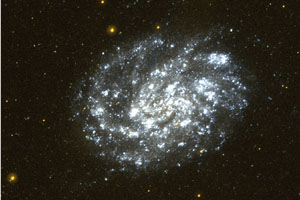Compton lectures to tell story of galaxy formation
By Steve KoppesNews Office
 The Galaxy Evolution Explorer, an orbiting telescope, captured this image of the spiral galaxy NGC 300 in 2003. | |
Learn what the universe is made of, how old it is, how it has been evolving since its conception and what scientists predict for its ultimate fate in a series of free, public lectures beginning Saturday, April 16, at the University.
The eight-part series, titled “The Story of Galaxy Formation in Our Universe,” will be held Saturdays from 11 a.m. to noon in Room 106 of the Kersten Physics Teaching Center, 5720 S. Ellis Ave.
Risa Wechsler, a Fellow in both the Enrico Fermi Institute and the Kavli Institute for Cosmological Physics at the University, will deliver the lectures. Among other things, she will explain how the study of cosmology has undergone a revolution in the past decade, driven by a wealth of observational data and by theoretical and computational advances.
Wechsler received her B.A. in physics in 1996 from the Massachusetts Institute of Technology and her Ph.D. in physics in 2001 from the University of California at Santa Cruz. Her research interests include cosmology and theoretical astrophysics.
The talks are the 61st series of the Arthur Holly Compton Lectures, sponsored each fall and spring by the University’s Enrico Fermi Institute. Compton was a University of Chicago physicist and a Nobel laureate, best known for demonstrating that light has the characteristics of both a wave and a particle. He also organized the effort to produce plutonium for the atomic bomb and directed the Metallurgical Laboratory at the University, where Fermi and his colleagues produced the first controlled, nuclear chain reaction in 1942.
The lectures are intended to make science accessible to a general audience and to convey the excitement of new discoveries in the physical sciences.
All lectures are free and open to the public. For more information, call (773) 702-7823.
![[Chronicle]](/images/sidebar_header_oct06.gif)